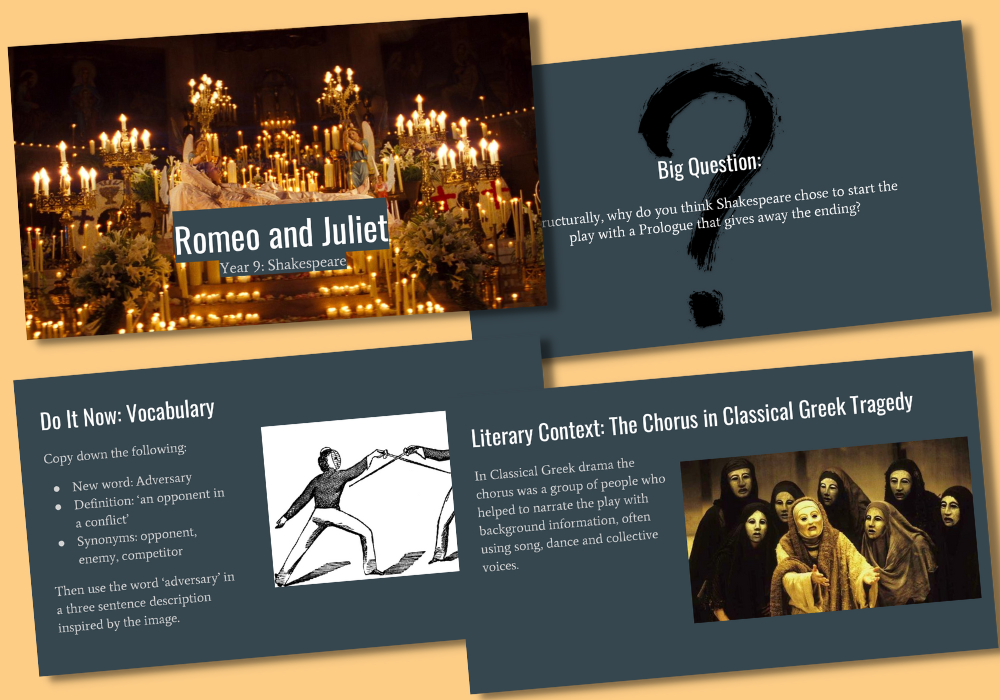Romeo and Juliet Key Quotations – Tybalt Capulet

Helen Mears picks out lines that could help students explain the significance of this minor, yet crucial, character…

- by Helen Mears

Who is Tybalt Capulet?
Tybalt is Juliet’s cousin, and he is the personification of hate in the first half of Romeo and Juliet. He is also the catalyst for the problems that blight our protagonists in the second half.
Peace? I hate the word…
Although not physically in the play for long, his influence is extensive and he is an omnipresent reminder of the feud between the two families.
“What, drawn, and talk of peace? I hate the word, As I hate hell, all Montagues, and thee.” Act 1, Scene 1, lines 56-7
Tybalt arrives into the play with a bang and his words to Benvolio cement his status as the bringer of hate.
Tybalt quotes
In Baz Luhrmann’s film of Romeo and Juliet he is hailed by a glimpse of a sign reading ‘Add More Fuel to your Fire’. It is a neat summary of his role in the play, to add fuel to the feud, and an excellent quote for any GCSE student’s armoury.
“Now by the stock and honour of my kin, To strike him dead I hold it not a sin.” Act 1, Scene 5, lines 55-6
When Tybalt sees that Romeo has gate-crashed the Capulet Ball, his first instinct is to want him dead for the intrusion upon Capulet territory. Although he is stopped from striking, it is this intrusion that makes Tybalt challenge Romeo to a duel.

Romeo and Juliet Complete Scheme of Work for KS4
This PowerPoint file is a complete unit of work for William Shakespeare’s Romeo and Juliet including lessons, resources, key themes, characters and context for KS4/GCSE lessons.
Tybalt: “It fits when such a villain is a guest. I’ll not endure him.“
Lord Capulet: “He shall be endured.” Act 1, Scene 5, lines 72-3
Tybalt informs his uncle that Romeo is at the party and he wishes to take action against him and is shot down by a Lord Capulet who is, perhaps, mindful of the warning issued to the families earlier that day that further fighting would result in executions.
Capulet also twice refers to Tybalt as ‘boy’ during his responses, clearly demeaning nomenclature for the fiery Tybalt. Does this goad him further into seeking revenge? Has Romeo inadvertently pushed Tybalt’s anger further?
“I will withdraw, but this intrusion shall Now seeming sweet convert to bitter gall.” Act 1, Scene 5, lines 88-9
Out of hearing of his uncle, Tybalt here swears that he will take revenge on Romeo later, a decision that will lead to his own death and that of Mercutio, and the separation of the lovers that eventually leads to their double suicide.
The lines directly precede the famous shared sonnet of Romeo and Juliet’s first meeting. It is a bitter reminder that the hate of their families is never far away from the two lovers.
“Mercutio, thou consort’st with Romeo” Act 3, Scene 1, line 38
There has been much debate about what Tybalt means by this line but, whatever it is, it makes Mercutio very angry.
Some commentators believe that it is a jibe about social status, and that Mercutio’s reply “What, dost thou make us minstrels of us?” is anger that Tybalt is referring to them as low-paid musicians but there is another school of thought that suggests that there is an implication of homosexuality about the accusation and that minstrels is also a reference to homosexuals.
Whatever he means by it, the remark stirs up the mood of confrontation and precipitates the fateful killing of Mercutio and its repercussions.
Helen Mears is an English teacher who sits on the education committee of the British Shakespeare Association.










